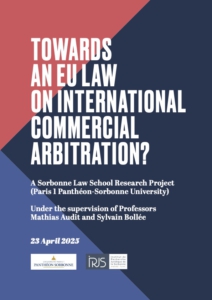Views
According to the French Cour de Cassation, the law applicable to the sub-purchaser’s direct action against the original seller depends on who brings the claim!
Written by Héloise Meur, Université Paris 8
In two rulings dated 28 May 2025, the French Cour de cassation (Supreme Court) ruled on the issue of the law applicable to a sub-purchaser’s direct action in a chain of contracts transferring ownership, under European private international law. The issue is sensitive. The contractual classification under French law —an outlier in comparative law— had not been upheld by the Court of Justice of the European Union (CJEU) to determine international jurisdiction under the Brussels system (CJEU, 17 June 1992, C-26/91, Jakob Handte). Despite CJEU’s position, the Cour de cassation had consistently refused to adopt a tort-based qualification to determine the applicable law (esp. Civ. 1st, 18 dec. 1990, n° 89-12.177 ; 10 oct. 1995, n° 93-17.359 ; 6 feb. 1996, n° 94-11.143 ; Civ. 3rd, 16 janv. 2019, n° 11-13.509. See also, Civ. 1st, 16 jan. 2019, n° 17-21.477), until these two rulings rendered under the Rome II Regulation.
“Towards an EU Law on International Commercial Arbitration?” A Sorbonne Law School Research Project

Written by Dr. Nima Nasrollahi-Shahri (Sorbonne Law School) and Vincent Bassani-Winckler (PhD Candidate, Sorbonne Law School), both authors participated in the Working Group.
A few days ago, the Sorbonne Law School released the final report of a collective research project chaired by Professors Mathias Audit and Sylvain Bollée, entitled “Towards an EU Law on International Commercial Arbitration?”.
Conducted within the IRJS (Institut de Recherche Juridique de la Sorbonne), and more specifically its research group on private international law, SERPI (Sorbonne – Étude des Relations Privées Internationales), this project sets out to examine whether and how to improve the relationship between commercial arbitration and EU law.
Civil Personal Status Law in the UAE and the Paradox of the Application of Foreign Law: A Legal Trap?

I. Introduction (*)
(*) For the sake of simplicity, reference will be made only to Federal Decree-Law No. 41/2022 of 2 October 2022 on Civil Personal Status. The Emirate of Abu Dhabi has enacted a separate law that addresses similar matters at the local level. For a comparison of the various applicable legal frameworks in family law in the UAE, see Béligh Elbalti, “The Personal Status Regimes in the UAE — What’s New and What Are the Implications for Private International Law? A Brief Critical Appraisal”.
There is no doubt that the introduction of the Civil Personal Status Law (CPSL) in the United Arab Emirates marks a significant turning point in the region’s legal landscape, particularly in areas traditionally governed by religious norms. The CPSL refers to the special law adopted at the federal level, which allows family law disputes involving non-Muslims (both foreigners and UAE citizens) to be resolved under a legal framework, that is intended to be modern, flexible, based on “rules of justice and fairness” and “the best international practices from comparative legal systems” (cf. article 19 of the Cabinet Resolution Concerning the Executive Regulation of Federal Decree-Law on the Civil Personal Status). However, the incorporation of the CPSL into the existing legal frameworks in the UAE has raised several issues. These include, among others, the articulation of the CPSL with the other applicable legal frameworks, and more importantly, the extent to which parties may opt out of this “modern” regime in favor of applying their own national laws (for a general overview, see Elbalti, op. cit.). Read more
News
Call for Abstracts: European Yearbook of International Economic Law 2026
We are happy to share the attached Call for Abstracts from the European Yearbook of International Economic Law for its 2026 volume, which will be dedicated on the “Reconstruction of International and European Economic Law”.
Abstracts can be submitted until 30 November 2025.
Virtual Early-Career Conference: ‘Global Harm, Local Justice | The Future of Cross-Border Torts’ (University of Groningen, 6 Feb 2026)
We are delighted to share the Call for Papers for a virtual early-career conference on ‘Global Harm, Local Justice | The Future of Cross-Border Torts’, hosted by K.C. (Kirsten) Henckel and M.A.S. (Martin) Bulla from the University of Groningen on 6 February 2026.
Abstracts of 300–500 words must be submitted by 1 December 2025.
Second Issue of the Chinese Journal of Transnational Law for 2025
The second issue of the Chinese Journal of Transnational Law for 2025 was just published. It contains a special issue on “Private International Law and Sustainable Development in Asia” with Ralf Michaels, Verónica Ruiz Abou-Nigm, Hans van Loon as guest editors. It builds on The Private Side of Transforming our World – UN Sustainable Development Goals 2030 and the Role of Private International Law.
Ralf Michaels, Verónica Ruiz Abou-Nigm, Hans van Loon, “Private International Law and Sustainable Development in Asia”
Since the publication of ‘The Private Side of Transforming our World – UN Sustainable Development Goals 2030 and the Role of Private International Law’ in 2021, the importance of private international law for sustainable development is increasingly being recognised. The article describes the background to that project and surveys its subsequent reception and further development in scholarly literature. Moreover, it traces the need for, and trend towards, regionalization of the relevant research, including in Latin America, Africa and Asia-Pacific. It can thus serve as introduction to the special issue on private international law and sustainable development in Asia.
The Chinese Foreign Relations Law (‘the FRL’) – a collection of rules legalizing China’s foreign policies – was enacted in 2023. While technically a set of policy goals and public law rules, it provides an opportunity to orient Chinese private international law (‘PIL’) towards sustainable development. Notably, the FRL connects Chinese PIL with sustainable development for the first time and revisits the conceptions of what is being understood as ‘domestic’ versus ‘foreign’, and ‘public’ versus ‘private’. This article explores how PIL can leverage this shift to accommodate sustainability as a normative value, foster positive interactions with foreign laws and courts, and develop a robust and tailored regulatory function. By doing so, Chinese PIL, as a form of foreign relations law, can expand its function beyond conflict resolution and develop a role in China’s foreign policy and global sustainability governance.
Ke Mu, “The Role of State-Owned Enterprises in the Pursuit of the Sustainable Development Goals”
In this paper, I argue that the civil registration and its distance from the private international law (PIL) pose peculiar challenges for achieving the goal of ‘Providing Legal Identity for All’ among the Asian intra-regional circular migrants. Civil registration of personal and family status combines public administration with private law. More public registration of personal status means more involvement of local public order and interest. Therefore, registration regulations are less attentive than PIL to the potential foreign-related legal situations. Hence, will greater public involvement in registration raise a conflict between the defence of ordre public and individuals’ aspirations to maintain their personal status? The territorial limits of administrative act have so far foreclosed the possibility of transnational civil registration. When it comes to the identity that does not fit into the domestic categories, questions arise whether and how to recognize them in the domestic legal system. This poses special burdens and additional costs for intra-regional circular migrants if their legal identity cannot be well defined and recognized in the several jurisdictions concerned, which is essentially contrary to the presumed erga omnes effect of individuals’ identity rights.
Despite the growing incidence of child abduction facilitated by the mobility and prevalence of non-resident marriages involving Indian and Nepalese citizens with foreign nationals, both India and Nepal have refrained from acceding to the 1980 Hague Convention on the Civil Aspects of International Child Abduction. The Indian executive has vocally supported criticisms against the Abduction Convention, advocating for the inclusion of domestic violence as a basis for exception under the Abduction Convention and proposed domestic legislation. In contrast, the official position of Nepal remains undisclosed, with recent case law offering limited insight into its engagement with the Abduction Convention. Against this backdrop, the article scrutinizes the recognition of gender perspectives in statutory provisions and case law in India and Nepal concerning international child abduction. It should be noted that Sustainable Development Goal (SDG) 5, which calls for the elimination of all forms of violence against women and girls in the public and private spheres – including trafficking, sexual and other types of exploitation – also includes addressing domestic violence in family spheres. This article, therefore, considers the inclusion of gender considerations within the realm of child abduction as a core consideration in the attainment of SDG 5.



